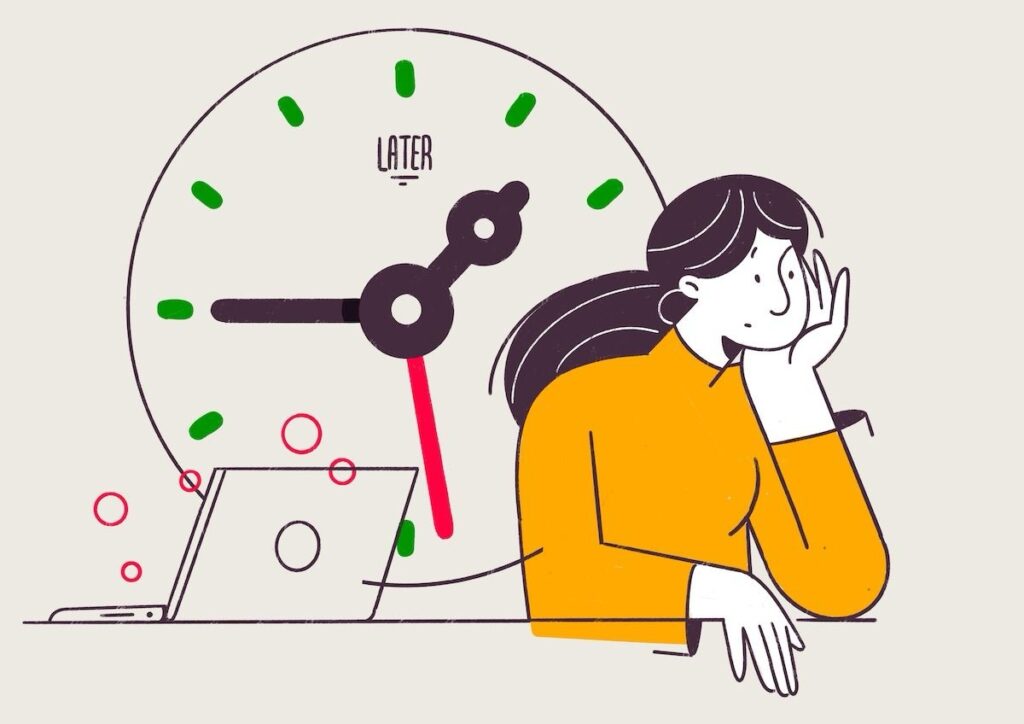
Procrastination is often viewed as a harmless habit, a mere postponement of tasks for another time. However, when it comes to achieving your dreams, procrastination is a silent killer that can derail your ambitions and aspirations. Whether your goals involve spending more quality time with family, gaining freedom from the confines of a nine-to-five job, or reaching new financial heights, procrastination stands as a formidable barrier. The key to overcoming this obstacle lies in recognizing its impact and taking immediate action.
The consequences of procrastination are far-reaching. It not only delays the fulfillment of your dreams but can also lead to a cycle of missed opportunities and regret. To illustrate, consider the various aspects of life that procrastination can negatively affect:
- Family Time: Procrastinating on plans to spend more time with family can lead to strained relationships and missed precious moments.
- Work Freedom: Delaying steps towards career changes or entrepreneurship can trap you in an unfulfilling job.
- Financial Goals: Postponing financial planning or investment can result in significant losses over time.
The antidote to procrastination is action. Starting today, making small, consistent steps towards your goals can break the chains of delay and set you on a path to success. Throughout this article, we’ll explore the psychological underpinnings of procrastination, its detrimental effects, and practical strategies to combat it.
Remember, every moment spent procrastinating is a moment stolen from your dreams. It’s time to act now and reclaim your future.

The Psychology Behind Procrastination
Understanding the psychological reasons behind procrastination is crucial to overcoming it. At its core, procrastination is not just about poor time management; it’s deeply rooted in our emotions and mindset. Here are some key psychological factors that contribute to procrastination:
Fear of Failure
One of the most common reasons people procrastinate is the fear of failure. The thought of not succeeding can be so overwhelming that it’s easier to avoid the task altogether. This avoidance creates a temporary sense of relief but ultimately leads to stress and regret as deadlines loom closer.
The Comfort Zone
Our brains are wired to seek comfort and avoid discomfort. Procrastination often occurs when a task seems too challenging or unpleasant, pushing us to stay within our comfort zones. However, growth and achievement lie outside this zone, and it’s essential to push past these boundaries.
Perfectionism
Perfectionism can be a significant barrier to getting started. The belief that every task must be completed perfectly can cause paralysis by analysis, where one spends more time planning and worrying about the outcome than actually doing the work.
Immediate Gratification
Humans are naturally inclined towards immediate gratification. The lure of short-term pleasures, such as watching TV or scrolling through social media, can easily distract from long-term goals. This tendency to prioritize immediate enjoyment over future rewards is a common procrastination trap.

Lack of Motivation
Without a clear sense of purpose or motivation, it’s easy to put off tasks. Motivation is often linked to the perceived value of the task and the rewards associated with its completion. Finding personal reasons and meaningful incentives to complete tasks can boost motivation and reduce procrastination.
Habit Formation
Procrastination can become a habit over time. When procrastination becomes a habitual response to stress or discomfort, it can be challenging to break free from this cycle. However, understanding this pattern is the first step towards change.
For a deeper dive into the limitations imposed by procrastination and how to overcome them, check out What Limitations Does the Phrase “I Can’t” Impose?.
By recognizing these psychological triggers, you can start developing strategies to combat procrastination and take control of your time and goals.

Procrastination: The Dream Killer
Procrastination doesn’t just delay tasks; it can derail your dreams and goals entirely. When you consistently put off taking action, you create a barrier between where you are now and where you want to be. Here’s how procrastination can be a dream killer:
Hinders Achieving Dreams
Every dream, whether it’s spending more quality time with family, gaining more freedom from work, or increasing your financial stability, requires consistent effort and action. Procrastination disrupts this process, leading to stalled progress and unfulfilled aspirations. By continually delaying your actions, you prevent yourself from moving forward and achieving your goals.
Family Time
Procrastinating on plans to spend more time with family can lead to missed opportunities and strained relationships. The moments you put off can never be regained, and over time, these delays can create a significant emotional distance between you and your loved ones.

Work Freedom
Many people dream of breaking free from the traditional nine-to-five job to pursue entrepreneurship or more flexible career options. However, procrastination can keep you trapped in an unfulfilling job. Delaying the steps needed to make a career change or start a new business means staying stuck in a routine that doesn’t align with your passions or goals.
Financial Goals
Procrastination can have severe long-term effects on your financial goals. Whether it’s saving for retirement, investing in the stock market, or planning for major expenses, putting off financial planning can result in significant losses. The earlier you start, the more time your investments have to grow and the more prepared you’ll be for future financial needs.
For example, consider the impact of delaying investments. By starting your investment journey early, you can take advantage of compound interest and market growth. A compelling success story of overcoming financial procrastination is detailed in From $14k to Millions: The Might of S&P 500 Returns.
Long-Term Effects
The long-term effects of chronic procrastination are profound. Over time, procrastination can lead to increased stress, anxiety, and a pervasive sense of regret. The accumulation of unfinished tasks and unachieved goals can erode self-esteem and create a cycle of inaction.
The good news is that recognizing procrastination as a barrier is the first step toward overcoming it. By understanding its impact on your dreams, you can start taking actionable steps to combat it. Remember, procrastination is the enemy of progress. The time to act is now, before your dreams slip away.
To learn more about turning your aspirations into reality and growing towards success, visit Plant Seeds of Growth & Attract Success Naturally.

Strategies to Overcome Procrastination
Overcoming procrastination requires a combination of self-awareness, practical strategies, and consistent effort. Here are several effective techniques to help you beat procrastination and start making progress towards your dreams:
Set Clear Goals
One of the most powerful ways to combat procrastination is to set clear, achievable goals. When you have a specific target in mind, it’s easier to break down the steps needed to reach it and stay focused on your objectives. Start by identifying your long-term goals and then break them down into smaller, manageable tasks.
Prioritize Tasks
Not all tasks are created equal. Prioritize your tasks based on their importance and deadlines. Use tools like to-do lists, planners, or digital apps to organize your tasks and ensure that you focus on the most critical ones first. This approach helps you stay on track and avoid feeling overwhelmed.
Create a Schedule
Creating a daily or weekly schedule can significantly reduce procrastination. Allocate specific time slots for each task and stick to your schedule as much as possible. By having a structured plan, you can avoid the temptation to put off important tasks.
Eliminate Distractions
Identify and eliminate distractions that hinder your productivity. This might involve creating a dedicated workspace, turning off notifications on your devices, or setting specific times for checking emails and social media. Reducing distractions helps you stay focused and maintain momentum.
Use the Two-Minute Rule
The two-minute rule is a simple yet effective strategy: if a task takes less than two minutes to complete, do it immediately. This rule helps you tackle small tasks right away, preventing them from piling up and becoming overwhelming.
Break Tasks into Smaller Steps
Large tasks can be daunting and lead to procrastination. Break them down into smaller, more manageable steps. This approach makes the tasks less intimidating and allows you to make steady progress without feeling overwhelmed.
Reward Yourself
Rewarding yourself for completing tasks can be a powerful motivator. Set up a system of small rewards for finishing individual tasks and larger rewards for achieving significant milestones. This positive reinforcement encourages you to stay on track and maintain your productivity.
Find Accountability
Having someone to hold you accountable can make a significant difference in overcoming procrastination. Share your goals with a friend, family member, or colleague who can check in on your progress and provide encouragement.
For more insights into setting goals and achieving success, check out Plant Seeds of Growth & Attract Success Naturally.
By implementing these strategies, you can begin to break free from the cycle of procrastination and start making tangible progress towards your dreams. Remember, the key is to take action now and stay consistent in your efforts. Every small step counts towards achieving your ultimate goals.

The Power of Immediate Action
Taking immediate action is one of the most effective ways to combat procrastination and start achieving your dreams. The benefits of starting now are numerous, ranging from increased momentum to a greater sense of accomplishment. Here’s why acting immediately is crucial and how it can transform your life:
Benefits of Starting Now
Momentum Builds Success: Once you begin a task, you create momentum that can carry you forward. This momentum makes it easier to continue working and accomplish more in less time. Starting now breaks the inertia of inaction and sets you on a path to continuous progress.
Reduces Stress and Anxiety: Procrastination often leads to increased stress and anxiety as deadlines approach. By taking action immediately, you alleviate the pressure and can work more calmly and efficiently. This proactive approach also helps prevent the buildup of tasks that can feel overwhelming.
Boosts Confidence: Completing tasks and seeing progress boosts your confidence and self-esteem. Each small victory reinforces your belief in your ability to achieve your goals, creating a positive feedback loop that encourages further action.
Maximizes Opportunities: Opportunities often come with a limited window. By acting quickly, you can seize these opportunities before they pass, whether it’s a career advancement, investment opportunity, or personal growth experience. Acting promptly ensures you don’t miss out on potential benefits.
Success Stories of Overcoming Procrastination
Many successful individuals have overcome procrastination to achieve their dreams. These stories serve as inspiration and proof that immediate action can lead to extraordinary results.
One such story is detailed in From $14k to Millions: The Might of S&P 500 Returns, which highlights the power of starting early and staying consistent with investments. By taking immediate action, you can leverage time and compound interest to build substantial wealth over the years.
The “No Pain, No Gain” Principle
The principle of “No Pain, No Gain” emphasizes that achieving significant results often requires enduring some level of discomfort or effort. This concept applies directly to overcoming procrastination. By pushing through the initial discomfort of starting a task, you pave the way for substantial rewards in the future.
For a motivational boost, consider the visual reminder provided by No Pain, No Gain. This mantra can help reinforce the importance of immediate action and persistence in the face of challenges.
Practical Steps to Start Today
Set a Start Date and Time: Commit to starting a specific task at a particular time. Putting it on your calendar makes it a priority and increases the likelihood that you’ll follow through.
Begin with Small Steps: If a task seems too daunting, start with a small, manageable step. The act of beginning can help overcome the initial resistance and make the larger task seem more approachable.
Create a To-Do List: Write down all the tasks you need to complete and prioritize them. A to-do list helps you stay organized and focused, making it easier to tackle one task at a time.
Stay Accountable: Share your goals with a friend or mentor who can help keep you accountable. Regular check-ins can motivate you to stay on track and make consistent progress.
By recognizing the power of immediate action and implementing these practical steps, you can break free from the grip of procrastination and move confidently towards achieving your dreams. The time to start is now.



